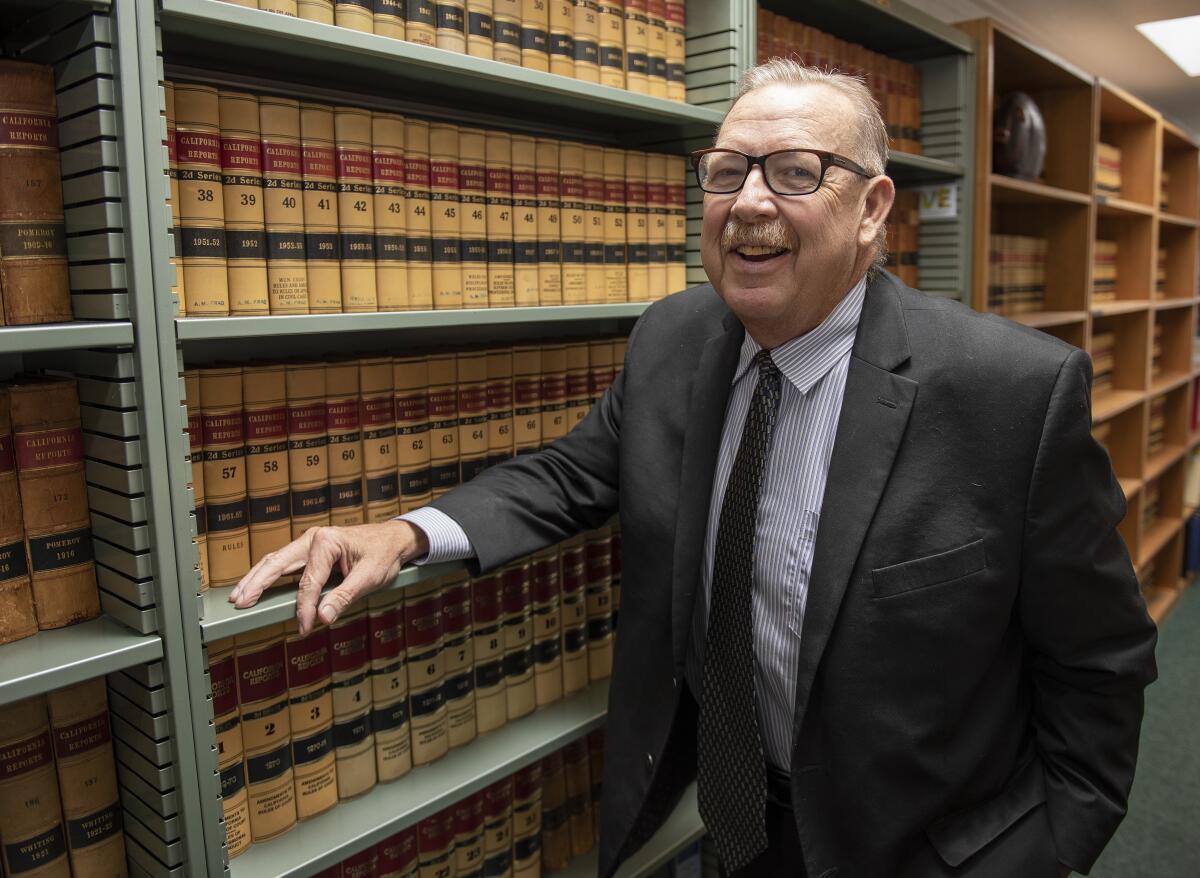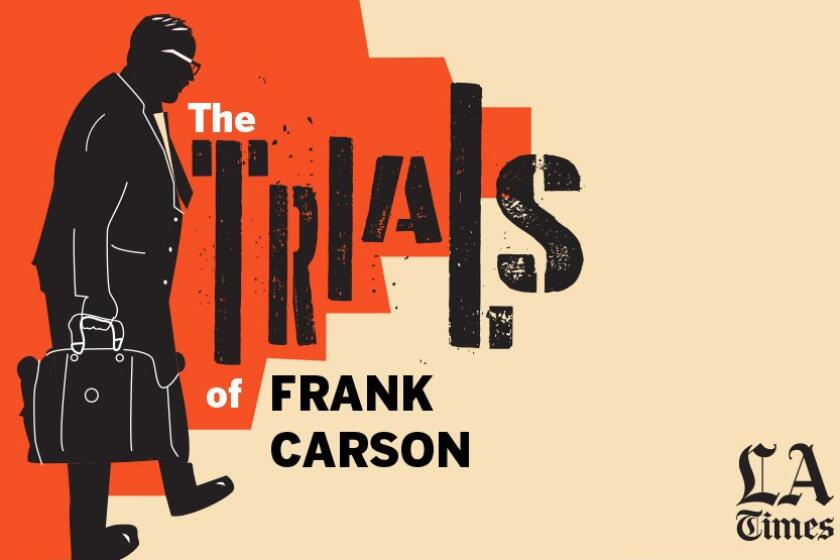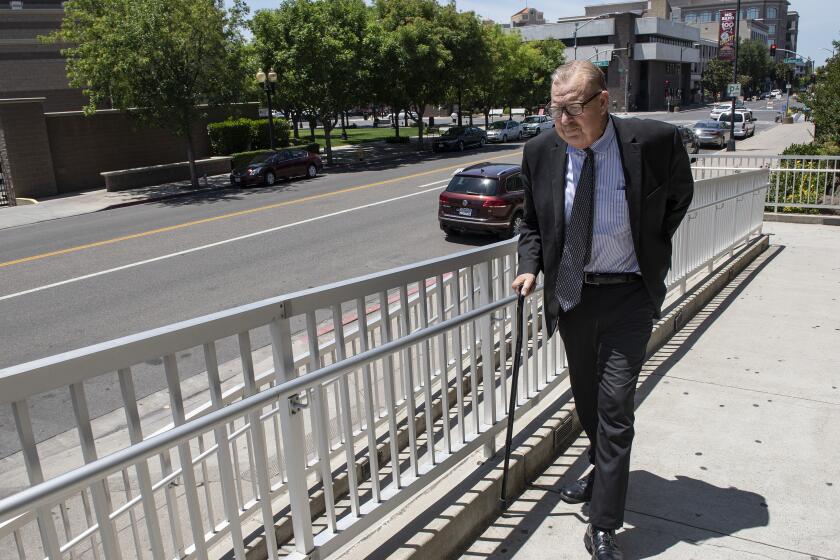Stanislaus County settles notorious malicious prosecution case for $22.5 million

- Share via
Six years after a jury acquitted a Modesto defense attorney and his codefendants in an alleged murder conspiracy, Stanislaus County has agreed to settle a malicious prosecution lawsuit for $22.5 million, one of the largest payouts of its kind in the history of the California courts.
County supervisors approved the settlement Tuesday on the threshold of a trial in the federal case, which was brought by eight plaintiffs who contended that police and prosecutors had fabricated the charges against them.
At the heart of the case was the late Frank Carson, a veteran Modesto defense attorney with a pugilistic style who delighted in antagonizing police and prosecutors. The ill feeling toward him at the Stanislaus County district attorney’s office was no secret.
Sign up for Essential California
The most important California stories and recommendations in your inbox every morning.
You may occasionally receive promotional content from the Los Angeles Times.
In August 2015, after a three-year investigation, the district attorney’s office accused him of masterminding a complicated plot to kill a scrap-metal thief, Korey Kauffman, as revenge for the alleged theft of pipes on Carson’s property.
Eight others were charged with helping Carson murder Kauffman or covering up the crime: two brothers who owned a local liquor store; three members of the California Highway Patrol; Carson’s wife and stepdaughter; and a drug-addled handyman who cut a deal in exchange for his cooperation.
No physical evidence linked any of the defendants to the death of 26-year-old Kauffman, whose fragmented skeleton was found in the Stanislaus National Forest in 2013, 17 months after he vanished. Kauffman, who stole habitually to feed his meth addiction, ran in a world where many people had wished him harm.

But investigators at the district attorney’s office — including those Carson had publicly denounced and ridiculed — decided to focus on him based on a tip that Kauffman had planned to steal from Carson’s property. The case resulted in an 18-month preliminary hearing and a 17-month trial, the second-longest murder trial in California history. Even as he stood trial for murder, Carson continued to practice law at the downtown Modesto courthouse.
“I’m getting paid back for 25 years of putting my thumb in the eye of the man,” Carson would say.
The Times explored the case in a 2021 podcast, “The Trials of Frank Carson.”
The star witness was the handyman, Robert Woody, who according to testimony was smoking crystal meth when he confessed to a girlfriend that he had killed Kauffman and fed his body to the pigs. Police arrested him, and Woody insisted he had made up the story to impress the girlfriend.
‘The Trials of Frank Carson’ is a true crime podcast about power, politics and law in California’s Central Valley. Carson was Stanislaus County’s most controversial defense attorney, a wizard with juries and a courtroom brawler with an unapologetically caustic style.
But a lead investigator in the district attorney’s office, Kirk Bunch — a man Carson had attacked as “dishonest and unprofessional” — promised Woody dire consequences if he didn’t cooperate, in an interview captured on tape.
“We can go for the death penalty or life without parole,” Bunch told Woody, who eventually gave prosecutors an elaborate story implicating Carson and others.
Woody’s story shifted many times, often under highly suggestive questioning from law enforcement, and he failed to lead police to a single piece of physical evidence linked to the homicide.
That did not stop prosecutors from building their case on his word. At trial, he testified that Carson had asked liquor store owner Bobby Athwal to watch out for thieves on his junk-strewn lot in Turlock, where — Woody claimed — he witnessed Athwal and his brother fatally attack Kauffman.
In an interview with The Times after the trial, Woody said he made up the whole account because he had no other choice. He was facing a charge of first-degree murder and wanted to see his family again. He described his testimony as “make-believe” and “stories they wanted to hear.”
In the end, Woody, who was allowed to plead no contest to manslaughter in exchange for a seven-year prison term, was the only person convicted in connection with Kauffman’s death.
Carson and the liquor store owners, Athwal and his brother Daljit, were acquitted in June 2019, and charges against the other co-defendants were tossed out by the court or prosecutors.
Carson’s family believes the stress of the criminal case, including 17 months he spent in jail, destroyed his health and contributed to the heart attack that killed him at age 66, a year after his acquittal.

“They called him aggressive, but he was the kind of defense attorney who stood up for his clients,” said Carson’s widow, Georgia DeFilippo, whose cut of the settlement is $4 million. “I think it broke his heart and broke his spirit. He wasn’t the same.”
She said she would like to see criminal charges brought against former Stanislaus County Dist. Atty. Birgit Fladager, who presided over the prosecution, and against others in her office.
“They invented a fiction and placed us in there as if we were characters in a badly written novel,” she said this week. “I’ll never get over the fact that that could be done, and they were able to walk away from it without any real [consequences].”
Modesto defense attorney Frank Carson spent years accusing local police and prosecutors of corruption. One day they accused him of masterminding a sprawling murder and cover-up conspiracy.
DeFilippo said she believes that she and her daughter were arrested on spurious charges merely to pressure her late husband into pleading guilty to a murder he didn’t commit.
“They didn’t care about me or my daughter or those poor highway patrolmen. They ruined their lives. They were after Frank,” she said. “I’ll never think about law enforcement the same way. I wake up and think, ‘Thank God I’m not in prison.’”
She is co-executor of Carson’s estate, which will also receive $4 million in the settlement. Her attorney, Gary Gwilliam, described the case as “a cautionary tale.”
“This is what happens when the government goes after people they don’t like,” Gwilliam said.
He said that during depositions in the civil case, the prosecutors and law enforcement officers who targeted Carson did not acknowledge that they had done anything wrong. “You can take it to the bank there was never any discipline of anybody,” Gwilliam said. “They said they thought they did the right thing. ‘We thought Woody was credible.’ They have to toe the line.”
The case was rife with mistakes, including the assignment of key roles to investigators with “pronounced histories of enmity” toward Carson and reliance on a witness, Woody, who had an incentive to lie, according to an analysis by Matt Murphy, a former Orange County prosecutor who served as an expert witness for the plaintiffs.

In a detailed report, Murphy said the “acrimonious history” between Carson and local prosecutors should have compelled the district attorney’s office to recuse itself. He concluded that the case should not have been filed in the first place. “I do not believe any reasonable jury would ever have convicted these defendants,” he wrote.
Doug Maner, a former Stanislaus County prosecutor and frequent critic of the district attorney’s office, said the prosecution was “the most horrible abuse of justice” and that the size of the settlement suggested a realistic fear that jurors might deliver a much larger penalty had the case gone to trial.
“The risk must have been gigantic to pay $22.5 million for it,” he said. “They obviously must have been concerned about a judgment double, triple that, which would have been appropriate under the facts of this case.”
“They went after the defense attorney they hated most,” he said. “They took an attorney and locked him up for a year and filed charges against his wife and his [step]daughter to extort a plea.”
The $22.5 million will be divided among the eight plaintiffs, including the three former CHP officers and the liquor store owners.
Thomas Boze, Stanislaus County counsel, said the money will be paid from the county general fund and insurance.
Stanislaus County Dist. Atty. Jeff Laugero, who took office in January 2023, described the settlement as “a necessary step to close a difficult chapter and maintain our focus on current public safety priorities.”
More to Read
Sign up for Essential California
The most important California stories and recommendations in your inbox every morning.
You may occasionally receive promotional content from the Los Angeles Times.













